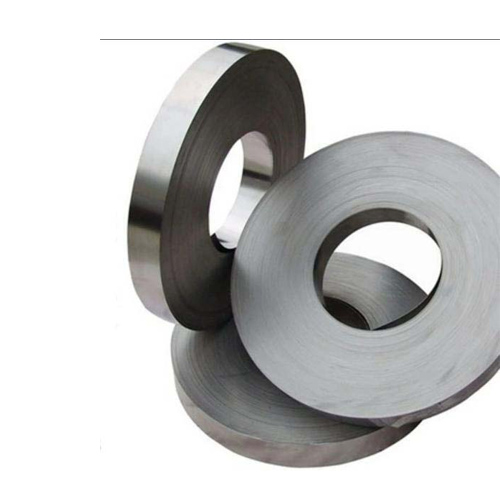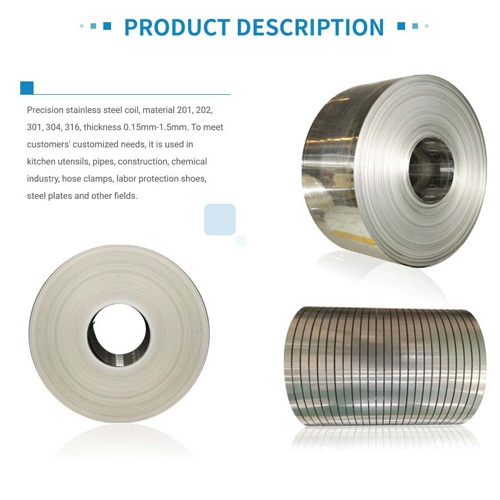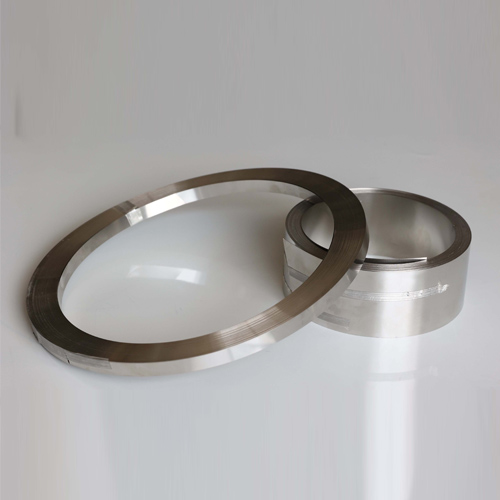- Phone:+86-17331948172 +86-0319-8862898
- E-mail: inquiry@puxingclamp.com
Aug . 16, 2025 02:20 Back to list
High Quality Stainless Steel Strip Roll | 301 & 316 Precision
Understanding the Critical Role of Stainless Steel Strip Rolls in Modern Industry
In the realm of advanced industrial manufacturing, the demand for high-performance materials that offer unparalleled durability, corrosion resistance, and aesthetic appeal continues to surge. Central to meeting these rigorous requirements is the stainless steel strip roll, a fundamental raw material driving innovation across numerous sectors. These precision-engineered coils, specifically our Thickness 0.1-2mm 201/304/202/316 Grade Stainless Steel Strips Cold Rolled Steel Coils, represent the pinnacle of material science and manufacturing excellence. The versatility of stainless steel, characterized by its chromium content, offers a passive layer that provides exceptional resistance to oxidation and various corrosive media, making it indispensable in environments ranging from humid coastal regions to chemically aggressive industrial plants. Current industry trends highlight a growing preference for materials that not only meet stringent technical specifications but also contribute to sustainable practices through extended service life and recyclability. The market for stainless steel strip roll products is expanding rapidly, fueled by developments in electric vehicles, renewable energy infrastructure, and advanced architectural designs, all of which necessitate materials capable of withstanding extreme conditions while maintaining structural integrity and visual quality. This evolution underscores the importance of selecting a reliable manufacturer capable of delivering high quality precision stainless steel strip tailored to exact application demands.
Advanced Manufacturing Process of High-Quality Stainless Steel Strip Coils
The production of a superior stainless steel strip roll involves a meticulously controlled, multi-stage manufacturing process designed to achieve specific material properties and dimensional accuracy. While traditional methods like casting and forging apply to larger stainless steel forms, strips predominantly undergo cold rolling, a process critical for achieving the specified thickness of 0.1-2mm and exceptional surface finishes. This journey begins with hot-rolled stainless steel coils, which are first descaled to remove surface oxides. Following this, the material enters the cold rolling mill, where it is passed through a series of rolls at room temperature. This mechanical reduction of thickness concurrently work-hardens the steel, significantly enhancing its tensile strength and yield strength, while ensuring precise gauge control. Subsequent annealing, a heat treatment process, is vital for restoring ductility and relieving internal stresses induced during cold deformation, optimizing the material's formability for downstream fabrication processes. The specific annealing temperature and holding time are critically controlled based on the stainless steel grade (e.g., 201, 304, 202, 316) to achieve the desired microstructure. Finally, a meticulous surface finishing process, such as bright annealing (BA) or 2B finish, is applied to meet diverse customer requirements, influencing both aesthetics and performance, particularly in applications requiring specific reflectivity or corrosion resistance. Throughout this entire sequence, rigorous quality control measures are implemented at every stage, adhering strictly to international inspection standards like ISO 9001 and ANSI specifications, ensuring each stainless steel strip roll meets the highest benchmarks for mechanical properties, chemical composition, and dimensional tolerances. This systematic approach guarantees consistent product quality and reliability for demanding industrial applications, with product lifespan often exceeding several decades when correctly applied, particularly in critical sectors like petrochemical processing, where long-term corrosion resistance is paramount, and in modern metallurgical applications, where material integrity is non-negotiable.

The meticulous control over each stage of manufacturing, from initial alloy selection to final inspection, is what defines a truly high quality precision stainless steel strip. For instance, the exact chemical composition of 301 stainless steel strip, characterized by its higher carbon content and slightly lower nickel, provides superior strength and hardness in cold-rolled conditions, making it an ideal choice for applications requiring robust spring properties or structural rigidity without excessive weight. Conversely, a high quality 316 stainless steel strip, fortified with molybdenum, offers exceptional resistance to pitting and crevice corrosion, particularly in chloride-rich environments, making it indispensable for marine applications, chemical processing, and pharmaceutical equipment. The precision afforded by cold rolling also ensures a uniform thickness across the entire stainless steel strip coil, which is crucial for high-speed stamping and forming operations, minimizing material waste and optimizing production efficiency. Furthermore, the inherent corrosion resistance of these stainless steel grades, coupled with proper surface treatment, contributes significantly to energy savings by reducing the need for protective coatings or frequent maintenance. In industries such as water supply and drainage systems, where constant exposure to water and various chemicals can degrade lesser materials, the longevity and inertness of stainless steel translate directly into reduced operational costs and enhanced system reliability. These advantages collectively highlight why a well-manufactured stainless steel strip roll is not merely a material but a strategic component that underpins the reliability and efficiency of modern industrial infrastructure.
Technical Specifications and Performance Metrics for Optimal Selection
Selecting the appropriate stainless steel strip roll necessitates a thorough understanding of its technical specifications and how these parameters translate into real-world performance. Key metrics such as material grade, thickness range, width, surface finish, and mechanical properties (tensile strength, yield strength, elongation, hardness) are paramount. Our product, available in grades 201, 304, 202, and 316, covers a thickness spectrum of 0.1mm to 2.0mm, making it suitable for a diverse array of precision applications. The choice between austenitic grades like 304 and 316, or the high-manganese 200 series (201, 202), hinges on the specific balance required between corrosion resistance, strength, and cost-effectiveness. For instance, Grade 304 is a highly versatile choice, known for its excellent formability and corrosion resistance in general atmospheric and mild corrosive environments. Its ductility allows for complex forming operations without cracking, making it a staple in kitchenware, architecture, and automotive components. Contrastingly, Grade 301 stainless steel is specifically engineered for applications demanding high strength and exceptional ductility, exhibiting remarkable work-hardening capabilities that enable it to achieve superior spring properties after cold working, making it a preferred material for springs, clips, and structural components in various industries. The surface finish, whether a dull 2B, bright annealed (BA), or polished No. 4, critically influences the material's aesthetic appeal, ease of cleaning, and resistance to environmental factors. For example, a BA finish offers a highly reflective surface, often chosen for decorative purposes or where a smooth, easily cleanable surface is required, such as in food processing equipment.
| Parameter | Details/Range | Relevant Grades (e.g., 301, 316) |
|---|---|---|
| Material Grades | 201, 202, 301, 304, 316, 430, etc. | All commonly produced grades |
| Thickness Range | 0.1mm - 2.0mm (Cold Rolled Precision) | All standard austenitic/ferritic |
| Width Range | Customizable from 10mm to 1500mm | Dependent on mill capabilities |
| Surface Finish | 2B (matte), BA (bright annealed), No. 4 (brushed), HL (hairline), Mirror | Varies by application/aesthetic |
| Tensile Strength (MPa) | Typically >520 (304), >580 (301, anneal.) | High strength for 301, general for 304/316 |
| Yield Strength (MPa) | Typically >205 (304), >275 (301, anneal.) | Correlates with tensile strength |
| Elongation (%) | Typically >40% (304/301) | Indicates formability/ductility |
| Hardness (HRB) | Typically | Higher for work-hardened conditions |

The detailed specifications presented in the table above illustrate the range of characteristics available in a stainless steel strip coil, enabling engineers and procurement professionals to make informed decisions. For instance, the high tensile and yield strengths of grades like 301 are crucial for applications requiring load-bearing capacity and resilience, such as in conveyor belts or automotive safety components, where failure could lead to catastrophic consequences. The superior corrosion resistance of high quality 316 stainless steel strip is not just a theoretical advantage; it translates directly into extended operational life and reduced maintenance in aggressive environments like coastal infrastructure, wastewater treatment plants, and pulp and paper mills. Furthermore, the inherent durability and low maintenance requirements of these materials contribute to a significant reduction in total cost of ownership over the product's lifespan, often offsetting initial material costs. This economic benefit, combined with the environmental advantages of recyclability, positions the stainless steel strip roll as a highly sustainable material choice. Understanding these nuances and leveraging the specific properties of each grade ensures that the chosen stainless steel product will perform optimally, delivering reliability and efficiency even in the most demanding industrial scenarios.
Diverse Applications and Key Advantages in Industrial Settings
The adaptability and robust performance of a stainless steel strip roll make it an indispensable material across an incredibly diverse range of industrial and commercial applications. From the intricate components of electronic devices to large-scale infrastructure projects, its unique properties provide significant advantages. In the automotive sector, high strength 301 stainless steel strip is extensively used for structural parts, exhaust systems, and trim, benefiting from its excellent formability and resistance to corrosion, which are crucial for vehicle longevity and safety. The increasing shift towards electric vehicles further amplifies the need for lightweight yet durable materials, where high quality precision stainless steel strip excels. In the electronics industry, thin gauge stainless steel strip coil finds application in connectors, springs, and enclosures due to its electrical conductivity, non-magnetic properties (in certain grades), and precise dimensional control. The medical field relies on stainless steel for surgical instruments, implants, and hospital equipment due to its biocompatibility, ease of sterilization, and resistance to disinfectants. Consumer goods, from appliances to kitchenware, benefit from the hygienic and aesthetic qualities of stainless steel, enhancing product lifespan and user satisfaction. A compelling application example is its use in modern heating, ventilation, and air conditioning (HVAC) systems, particularly for ductwork and heat exchangers, where its inherent corrosion resistance significantly extends the system's operational life compared to traditional galvanized steel, reducing energy losses through optimal airflow and minimizing costly replacements. This directly contributes to energy savings and lower operational expenditures for commercial buildings and industrial facilities, validating the long-term value proposition of high-grade stainless steel.

The unparalleled corrosion resistance of a stainless steel strip roll is perhaps its most celebrated attribute, a benefit that extends its utility into highly aggressive environments. For example, in the chemical processing industry, high quality 316 stainless steel strip is the material of choice for tanks, piping, and reactors, owing to its superior resistance to chlorides and various acids, which prevents material degradation and contamination of sensitive products. Similarly, in the marine sector, the enhanced molybdenum content of 316 grade stainless steel renders it impervious to saltwater corrosion, making it ideal for boat fittings, rigging, and offshore platforms. Our commitment to providing diverse grades, including those produced by a specialized 301 stainless steel manufacturer, ensures that specific industry demands for strength, corrosion resistance, and formability are met precisely. Recent projects showcase successful implementations: a major petrochemical plant upgraded its heat exchange units with 316 stainless steel strips, reporting a 20% increase in operational efficiency and a 35% reduction in maintenance cycles over five years, primarily due to the material's excellent thermal conductivity and anti-fouling properties. Another case involved a precision stamping company that switched to our high quality precision stainless steel strip for intricate automotive components, reducing their scrap rate by 15% and achieving tighter tolerances previously unattainable with conventional materials. These real-world examples underscore the tangible benefits—energy efficiency, reduced downtime, enhanced safety, and extended asset life—that a properly selected and manufactured stainless steel strip roll brings to complex industrial operations, reinforcing its critical role in today's demanding market landscape.
Choosing the Right Partner: Customization, Certifications, and Customer Support
The success of any large-scale industrial project hinges not only on the quality of the materials but also on the reliability and capability of the supplier. When sourcing a stainless steel strip roll, it is paramount to partner with a manufacturer who demonstrates proven expertise, adheres to stringent quality standards, and offers comprehensive support. A distinguished 301 stainless steel manufacturer, for example, will not only provide technical specifications but also offer insights into optimal application and processing. Our company, with years of specialized experience in producing Thickness 0.1-2mm 201/304/202/316 Grade Stainless Steel Strips Cold Rolled Steel Coils, has built a reputation for delivering high quality precision stainless steel strip tailored to unique customer requirements. We understand that standard products may not always fit bespoke industrial needs, which is why we offer extensive customization options, including specific widths, finishes, and precise mechanical properties to match exact project specifications. Our commitment to quality is underscored by comprehensive certifications, including ISO 9001:2015, which signifies our dedication to maintaining a robust quality management system through every phase of manufacturing and delivery. Furthermore, our products consistently meet or exceed relevant ASTM and EN standards, providing third-party assurance of material composition and performance. We proudly serve a global clientele, including long-term partnerships with leading engineering firms in the petrochemical and construction industries, testament to our consistent product quality and reliable service delivery.

Trustworthiness in a supplier of stainless steel strip is also built upon transparent operations, reliable logistics, and proactive customer support. Our typical delivery cycles are meticulously managed to ensure just-in-time supply for critical projects, minimizing inventory costs and production delays for our clients. We maintain substantial stock levels of common grades and sizes while also streamlining production for custom orders, ensuring efficiency from inquiry to dispatch. Every stainless steel strip roll comes with a robust quality assurance program, including detailed material test reports (MTRs) for full traceability and a comprehensive warranty against manufacturing defects, providing our customers with absolute peace of mind. Beyond sales, our dedicated technical support team offers expert consultation on material selection, application challenges, and processing techniques, ensuring that clients leverage the full potential of our products. Whether you are a 301 stainless steel manufacturer seeking a reliable supplier or a large-scale enterprise requiring high quality 316 stainless steel strip for specialized applications, our commitment extends beyond the transaction to foster long-term, mutually beneficial relationships. This holistic approach, encompassing superior product quality, flexible customization, rigorous certifications, efficient logistics, and unparalleled customer service, positions us as a premier partner for all your stainless steel strip coil requirements, facilitating project success and operational excellence.
Frequently Asked Questions (FAQ) & Authoritative Resources
Frequently Asked Questions
Q: What are the primary advantages of cold-rolled stainless steel strip rolls?
A: Cold-rolled stainless steel strip rolls exhibit superior surface finish, enhanced mechanical properties such as increased tensile strength and yield strength, and tighter dimensional tolerances compared to hot-rolled alternatives. This precision makes them ideal for applications requiring exact specifications and aesthetic appeal, offering excellent formability and consistency crucial for automated manufacturing processes. Their uniform thickness and improved structural integrity contribute to reduced waste and higher production efficiency in demanding industrial environments, where even slight variations can impact assembly or performance. The cold rolling process also imparts a finer grain structure, which can lead to improved fatigue resistance, making these strips highly reliable for components subjected to repeated stress cycles over long operational periods. This method is particularly effective for producing thin gauge stainless steel strip for precision applications, allowing for intricate designs and reduced material usage without compromising strength or durability.
Q: How does the choice of stainless steel grade (e.g., 301, 304, 316) impact an application?
A: The selection of a specific stainless steel grade is critical and depends heavily on the intended application's environmental conditions and performance requirements. For instance, Grade 301 stainless steel is renowned for its high strength and excellent ductility, making it suitable for springs, automotive parts, and structural components where resilience and formability are paramount. Its capacity for significant work hardening allows engineers to achieve specific strength levels through mechanical processing. Grade 304 offers a superb balance of corrosion resistance, formability, and weldability, making it a versatile choice for a wide array of general-purpose applications in industries ranging from food processing to architecture. It's often considered the workhorse of austenitic stainless steels due to its broad utility and cost-effectiveness. Conversely, Grade 316, with its added molybdenum content, provides significantly enhanced resistance to pitting and crevice corrosion, particularly in chloride-rich or acidic environments, thus making it indispensable for marine applications, chemical processing equipment, and medical devices. Understanding these distinctions ensures optimal material performance, longevity, and overall cost-efficiency, preventing premature material failure and ensuring regulatory compliance in specialized sectors.
Q: What quality certifications should I look for when sourcing stainless steel strip rolls?
A: When procuring stainless steel strip rolls, it is crucial to prioritize suppliers who adhere to stringent international quality management and product standards. Key certifications to look for include ISO 9001 for quality management systems, which indicates a robust framework for consistent product quality and customer satisfaction throughout the manufacturing process, from raw material procurement to final product inspection. Material-specific certifications such as ASTM (American Society for Testing and Materials) and EN (European Norms) ensure that the chemical composition, mechanical properties, and surface finish meet defined industry benchmarks. For specialized applications, certifications like FDA compliance for food-grade materials or specific industry standards (e.g., for aerospace, medical devices, or pressure vessels) may also be necessary, signifying adherence to sector-specific safety and performance criteria. These certifications provide independent verification of a manufacturer's commitment to delivering reliable, high-performance materials, offering assurance regarding traceability, consistent quality, and conformity to specified technical requirements, which is vital for risk mitigation in critical applications.
Authoritative Resources
- ASM International, "Handbook of Stainless Steels."
- The European Stainless Steel Development Association (Euro Inox) Technical Publications.
- American Iron and Steel Institute (AISI) Stainless Steel Technical Guides.
- Journal of Materials Processing Technology.
- National Institute of Standards and Technology (NIST) Material Science Databases.
-
Large Stainless Steel Adjustable American Type Hose Clamp - Hebei Pux Alloy Technology Co., Ltd|Corrosion Resistance&Adjustable Design
NewsAug.16,2025
-
Large Stainless Steel Adjustable American Type Hose Clamp - Hebei Pux Alloy Technology Co., Ltd
NewsAug.16,2025
-
Large Stainless Steel Adjustable American Type Hose Clamp-Hebei Pux Alloy Technology Co., Ltd|Corrosion-Resistant&Adjustable Design
NewsAug.16,2025
-
High Quality Stainless Steel Strip Roll | 301 & 316 Precision
NewsAug.16,2025
-
Large Stainless Steel Adjustable American Type Hose Clamp - Hebei Pux Alloy Technology Co., Ltd
NewsAug.15,2025
-
Large Stainless Steel Adjustable American Type Hose Clamp-Hebei Pux Alloy|Durable Stainless Steel Construction&Adjustable Design
NewsAug.15,2025




